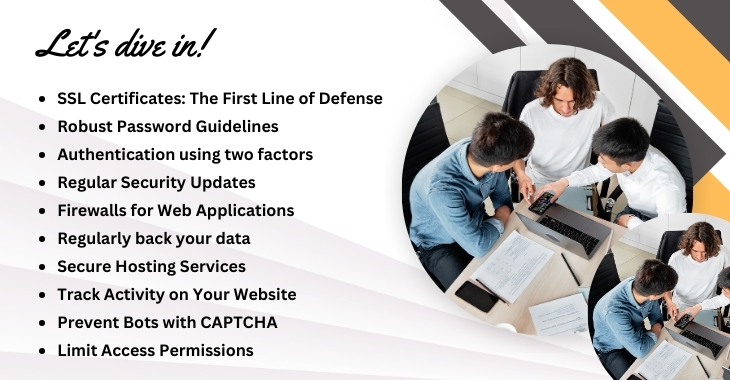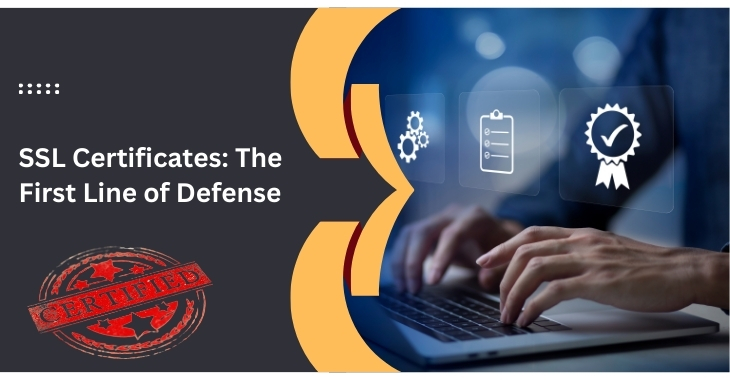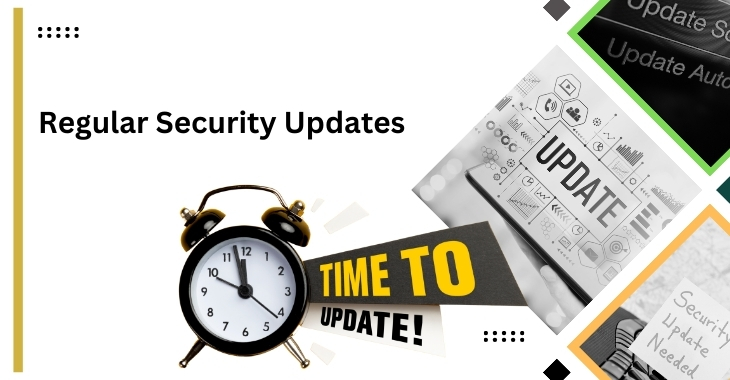The internet is evolving, and so are the threats it faces. In 2025, ensuring your website is secure isn’t just an option—it’s necessary. Whether you’re a small business owner or part of an Website Development Company in India, safeguarding your website can protect your data and reputation. Curious to know how you can build a more secure online presence?

Let’s dive in:-
1. SSL Certificates: The First Line of Defense
2. Robust Password Guidelines
3. Authentication using two factors
4. Regular Security Updates
5. Firewalls for Web Applications
6. Regularly back your data
7. Secure Hosting Services
8. Track Activity on Your Website
9. Prevent Bots with CAPTCHA
10. Limit Access Permissions
SSL Certificates: The First Line of Defense:
An SSL certificate is now a need rather than a “nice-to-have.” Encrypting data as it moves between your website and its visitors makes it more difficult for hackers to intercept.

Additionally, search engines give SSL-enabled websites preference, so SEO benefits as well!
Robust Password Guidelines:
Weak passwords encourage cybercriminals. Ensure that users, admins, and anybody else with backend access are subject to strict password policies on your website.

This can include demanding a combination of symbols, numbers, lowercase letters, and capital letters.
Authentication using two factors (2FA):
When you can double up on security, why rely just on passwords? Two-factor authentication offers an additional layer of security by asking users to confirm their identity using a second method, such as a number texted to their phone.

Regular Security Updates:
Hackers constantly devise new methods to access websites. Update your website’s themes, plugins, and software frequently to fix bugs. One of the simplest ways to defend your website against cyberattacks is to keep it updated.

Firewalls for Web Applications (WAF):
A web application firewall protects your website from potential dangers. It monitors and filters traffic to stop harmful activities like SQL injection and cross-site scripting (XSS).

Regularly back your data:
Have a backup plan at all times because no security system is infallible. Make regular backups of your website’s data so you can promptly restore it in case of an emergency. Cloud-based backup solutions are particularly useful for this.

Secure Hosting Services:
Your hosting company greatly influences the security of your website. Select a hosting provider with strong security features such as automated upgrades, DDoS protection, and virus scanning.

Track Activity on Your Website:
Keep an eye on your website’s activity. Monitoring software can help you monitor suspicious behavior, file modifications, and login attempts. Early discovery can avoid larger issues.
Prevent Bots with CAPTCHA:
Have you ever wondered why CAPTCHA is used on so many websites? It’s because bots pose a serious risk. CAPTCHA aids in distinguishing between automated bots attempting to take advantage of your website and actual users.

Limit Access Permissions:
Not every user needs to be able to access every section of your website. Limit user responsibilities and permissions so only those with permission can view sensitive data or make major changes.

Conclusion
Maintaining the security of your website is a continuous duty, not a one-time event. Because cyber dangers are becoming more complex every day, being proactive today might help you avoid expensive problems later. If you want to work with an Website Development Company In India, then you can get assistance from Vxplore Technologies for the best guidance and services.




